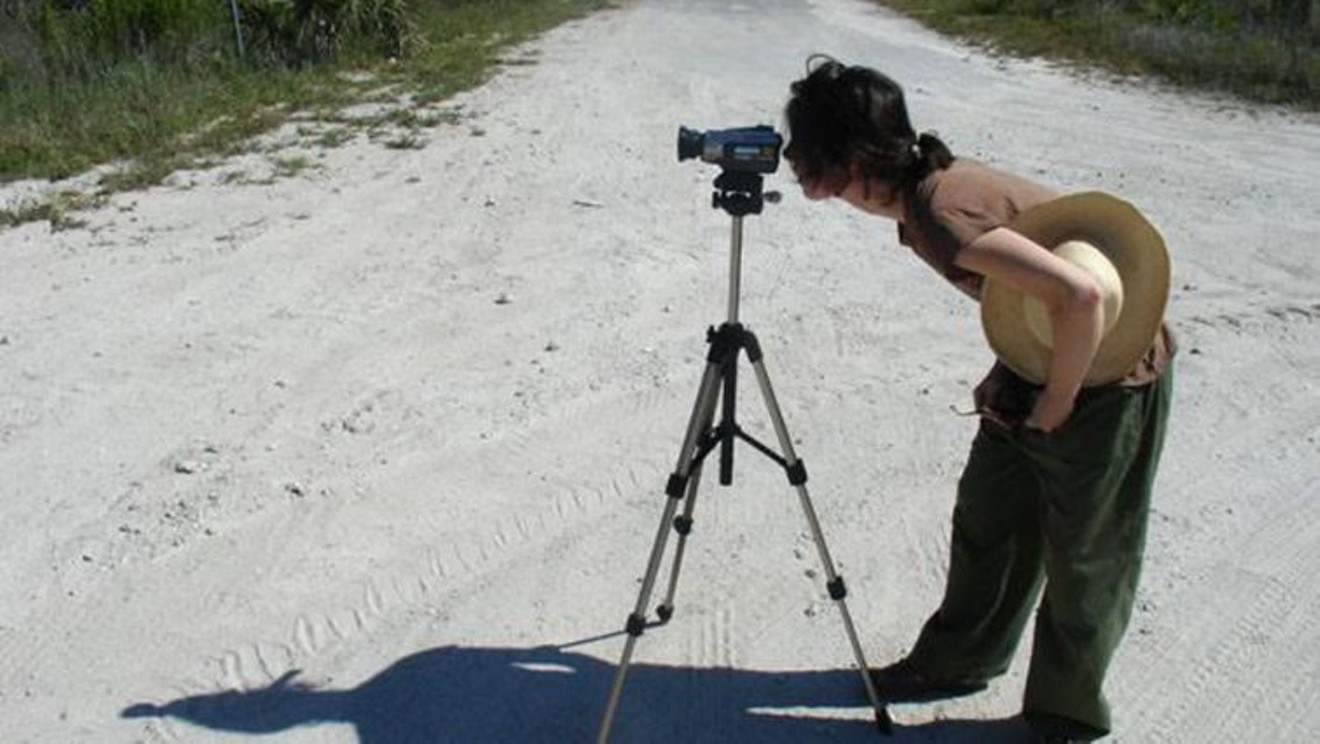When white supremacists and anti-racists clashed on the University of Virginia campus in Charlottesville, Lydia Moyer, who teaches at the school, was out of town. It's not surprising that the experimental media-maker was traveling: For the past few years, she has worked on a series of short movies, including The Forcing, about what it feels like to know there are huge historical events afoot – think glaciers melting and Ferguson erupting in protest after a police officer killed Michael Brown — all around her, even as her life is centered on mundane activities like gardening.
As Charlottesville turned into a battleground over fascism, Moyer wound up watching the clashes from behind her laptop in Helsinki, which she was visiting at the time, clicking on news stories to try to follow what was happening. And when she returned home, a few days after the clashes, she came back to a stunned city.
"I think it was actually very traumatic for people in the community and people at the university," she says. "I think there is a lot of shame. I think people who didn't participate have a lot of consternation, and people who did are traumatized by the violence they witnessed. I think it's palpable in the community — in that sense, people are going about their lives and eating dinner out."
In the days following the clash, Moyer, who will be presenting her shorts tonight, September 22, at Collective Misnomer's one-year-anniversary screening, attended a vigil, joined community conversations about race and the legacies of white supremacy at UVA, and used her tools as a video artist to reflect on what's happening. She shot and showed a short about it, "For the Students Who Stood at the Statue," at Now! A Journal of Urgent Praxis, a website hosting ultra-short agitprop, videos and gifs produced by media artists who tackle immediate political issues.
Moyer is well aware of how her political shorts fit into the history of video art and how the first Porta-pac video cameras, which freed TV production from the studio, allowed video-activist collectives to document social struggle in the ’60s. But she does not fancy herself an activist filmmaker in that lineage.
"I don't work as a collective," she says. "My equipment isn't pooled with people. I'm not going out and trying to record images and sounds in communities that I feel are underrepresented. So I'm not directly engaging with those tactics, which were a lot of the tactics of early video art and community media, which I did work in."
In her early twenties, Moyer worked for the Appalachian progressive-minded filmmaking nonprofit Appalshop in Whitesburg, Kentucky, where she got a schooling outside school in documentary-making as a tool for social change.
While she learned a lot from the straight storytelling and values-based production style of that organization, she went off to make movies that defy traditional narrative structures, sometimes playing sounds from one scene over images from another, creating disquieting effects that make viewers think about the meaning of what they see and hear. In other movies, she puts the process itself on display, forcing us to question most assumptions we bring into a theater: that movies should tell a story and that filmmakers should make themselves invisible, allowing audiences to lose themselves in an emotionally involving cinematic experience.
In breaking those rules, Moyer is not concerned about winning hearts and minds or persuading people to agree with her. She's not even showing what's happening with any traditional sense of coherence. Instead, she makes movies designed to disrupt viewers' expectations of how story should work, asking them to consider how the biggest social and environmental issues of our day are represented in media.
Her films are not always easy to watch. Just as good poems need to be read multiple times, her works demand multiple viewings — something she's quick to admit that most audiences will never bother to do, or even have the opportunity to do.
Collective Misnomer's One-Year Anniversary Screening: State Change: A Solo Screening of Lydia Moyer in Person, starts at 8 p.m. Friday September 22, at Alamo Drafthouse Sloan's Lake, 4225 West Colfax Avenue, $10.
[
{
"name": "Air - MediumRectangle - Inline Content - Mobile Display Size",
"component": "12017618",
"insertPoint": "2",
"requiredCountToDisplay": "2"
},{
"name": "Editor Picks",
"component": "17242653",
"insertPoint": "4",
"requiredCountToDisplay": "1"
},{
"name": "Inline Links",
"component": "18838239",
"insertPoint": "8th",
"startingPoint": 8,
"requiredCountToDisplay": "7",
"maxInsertions": 25
},{
"name": "Air - MediumRectangle - Combo - Inline Content",
"component": "17261320",
"insertPoint": "8th",
"startingPoint": 8,
"requiredCountToDisplay": "7",
"maxInsertions": 25
},{
"name": "Inline Links",
"component": "18838239",
"insertPoint": "8th",
"startingPoint": 12,
"requiredCountToDisplay": "11",
"maxInsertions": 25
},{
"name": "Air - Leaderboard Tower - Combo - Inline Content",
"component": "17261321",
"insertPoint": "8th",
"startingPoint": 12,
"requiredCountToDisplay": "11",
"maxInsertions": 25
}
]












